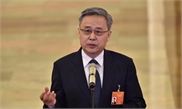Chinese official paper warns of financial risks posed by US policies, domestic market
Uncertainty rises, but no need for ‘U-turn’ monetary policy: analysts

Photo: Courtesy of Tsinghua PBCSF
With lingering uncertainty over the global economic recovery from COVID-19 and spillover effects from US monetary and fiscal policies, China needs to be aware of financial risks amid concerns over surging US inflation, according to an annual financial policy report released on Sunday that also said there wouldn't be a "sharp U-turn" in China's monetary policy this year.
A major contradiction facing global monetary policymaking is that there's adequate liquidity while inflationary expectations are conspicuously rising, Lu Lei, deputy head of the State Administration of Foreign Exchange (SAFE), said on Sunday when releasing the report at the Tsinghua PBCSF Global Finance Forum in Beijing.
The US Fed reiterated at its April meeting that it's not yet time to talk about tapering the policy of quantitative easing, continuing to send a dovish signal. Meanwhile, the world's major central banks also largely maintain a dovish stance.
Nonetheless, US consumer inflation soared to 4.2 percent in April, beating estimates of 3.6 percent and roiling the stock and bond markets.
The US bond market's five-year inflation outlook has jumped to the highest since 2005, Lu said, warning of a possible lasting and far-reaching impact on the exchange rate, the financial sector and the real economy from the prolonged liquidity easing.
Many economists and market observers believe that the US inflation risk has hit the highest level in over a decade, and the possibility of the Fed raising interest rates sooner than expected is increasing.
Once the liquidity trend reverses, the global economy will take a huge hit, they said.
The real economy around the world is now recovering, "but financial markets have shown an increasing trend toward turmoil, with zero or even negative interest rates, as well as massive injections of liquidity," said Ju Jiandong, director of the Center for International Finance and Economics Research under the National Institute of Financial Research, Tsinghua University.
Before the pandemic, the financial market was like a river - now, it's like the sea, maintaining unprecedented powers, Ju told the Global Times in an interview on the sidelines of the forum.
Against the backdrop of the increasingly turbulent "sea", it's only a matter of time until a financial crisis occurs, he warned.
But once the Fed raises interest rates, its impact on the US market will have an adverse spillover effect on the world.
According to Ju, the US financial markets so far remain the strongest in the world. It's believed that Fed can stabilize the US market once monetary policy changes; however, it may trigger a crisis elsewhere, such as in developing countries, since a US monetary policy tightening will draw capital to flow back and other countries may unfortunately face risks of hyperinflation and capital flight.
In light of this, China needs to stay vigilant about the possible short-term impact from monetary policy shifts in developed countries, said Zhang Xiaohui, dean of Tsinghua University PBC School of Finance.
"We need to closely monitor changes in global asset price inflation and possible consequent excessive leverage or turmoil in financial markets, and we must be prepared to address different inflationary scenarios," Zhang said.
"In particular, we need to properly manage expectations and stay cautious about the rise of structural inflation, which may lead to overheated investments in certain sectors," she continued.
In addition to woes over external shocks, China's domestic financial risks are also accumulating during the post-COVID-19 period, per the Sunday report.
The country's anti-virus credit policy resulted in an increase in its macro leverage ratio, or real economy debt as a percentage to GDP, to 270 percent at 2020 year-end from 246 percent at the end of 2019.
So long as the economy maintains steady growth, the goal of "stable leverage" will be well within reach, meaning a drastic shift in monetary policy is unnecessary, according to the report, which argued against a sharp U-turn in monetary policy.
To cope with the potential crisis, China needs to ramp up its push to globalize the yuan and quicken the pace of its capital market opening-up, Ju advised.
"China has made risk management a priority for the financial services industry and the country. It's been very clear about this priority. This is foresighted and will result in only more positive outcomes and advancements," Richard Apostolik, president and CEO of the Global Association of Risk Professionals, said in a speech at the forum.
China, given its rapid market opening timeline and global status, must also pay special attention to its financial services professionals and their ability to demonstrate that they can compete with well-established global players who are utilizing globally standardized approaches in assessing risks and moving markets forward, according to Apostolik.

